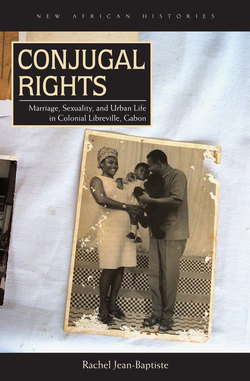Conjugal Rights

Реклама. ООО «ЛитРес», ИНН: 7719571260.
Оглавление
Rachel Jean-Baptiste. Conjugal Rights
Отрывок из книги
Conjugal Rights
SERIES EDITORS: JEAN ALLMAN AND ALLEN ISAACMAN AND DEREK R. PETERSON
.....
In an edited volume urging scholars to “re-think” sexualities in Africa, Signe Arnfred argues that European imaginaries of African sexuality have oscillated from ideas of the exotic and the noble and depraved savage, yet have been continually “other” in comparison to the norm of European sexuality.55 Historians have analyzed European discourses of African sexualities as more fraught than Arnfred portrays.56 Megan Vaughan’s work on biomedical discourses in colonial British Central and East Africa and Diana Jeater’s book on colonial moralist conceptions of African sexuality in early colonial Southern Rhodesia demonstrate that no dominant, hegemonic colonial discourse emerged, but rather a range of discourses. Megan Vaughan underlines how colonial representatives expressed anxieties about African women’s sexuality in urban areas in particular and associated African women’s sexuality with disease and social breakdown. Vaughan traces how state-employed doctors and medical missionaries conceptualized and debated the mechanisms of syphilis vaccination campaigns to construct governable African subjects.57 In analyzing changing discourses of biomedicine, Vaughan’s analysis demonstrates the persistent import of controlling African women’s bodies by the apparatuses of colonial rule. Diana Jeater also demonstrates the multivalent nature of European ideas of African sexuality and how efforts to regulate sexuality were central to colonial rule. Jeater analyzes European discourses to argue that the colonial encounter profoundly altered ideas about and practices of sexuality. Between 1910 and 1930s colonial Rhodesia, Jeater argues, Christianity and migration to towns produced the idea of individual responsibility and “sin,” as well as the idea that sexuality could take place outside of the sanction of family groups.58 By focusing primarily on colonial discourses, we have not been fully able to understand the meanings of sexuality and the complexities with which African historical actors thought of and embodied their sexuality. Furthermore, how did ideas about sexuality intersect with praxes of sexuality?
Marriage was a primary relationship through which African men and women in Libreville articulated and experienced sexuality. A critical mass of books has chronicled social and economic change in Africa through the lens of marriage.59 As this body of scholars, including Brett Shadle, has shown, “nowhere in colonial Africa was marital stability a foregone conclusion.”60 In the region that became Libreville, men and women engaged in varied forms of extramarital sexual relationships prior to the colonial encounter, and over the course of the decades of colonial rule new forms of extramarital sexual relationships developed. However, in spite of marital instability, there was a persistence with which Libreville’s residents used changing forms of conjugal relationships as a metaphor in conceptualizing sexuality. As argued by Stephanie Newell, scholarship on marriage in Africa has emphasized “economic and social power rather than . . . desire and pleasure or coercion.”61 Furthermore, Jennifer Cole and Lynn Thomas contend that love, “the sentiments of attachment and affiliation that bind people to one another—in sexual, predominantly heterosexual, relationships,” is a neglected lens of research in African studies.62 I take seriously notions of sexual desire and love as units of analysis. Yet, following historical actors’ conceptions of heterosexual relationships as also mediating economic mobility, I engage the recent literature on love and money in contemporary Africa that demonstrates how people viewed well-being in relationships according to both material and emotional fulfillment.63
.....